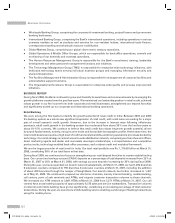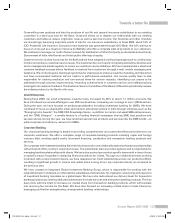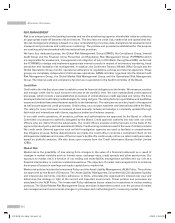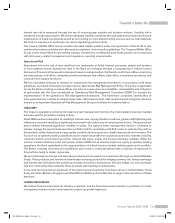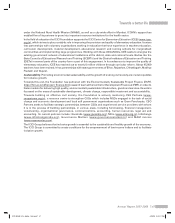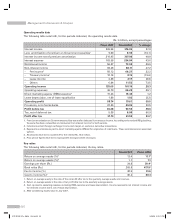ICICI Bank 2008 Annual Report Download - page 48
Download and view the complete annual report
Please find page 48 of the 2008 ICICI Bank annual report below. You can navigate through the pages in the report by either clicking on the pages listed below, or by using the keyword search tool below to find specific information within the annual report.
products, including health, weather and cattle insurance to help mitigate the impact of other contingencies such
as illness and crop failure. ICICI Prudential Asset Management Company (ICICI AMC) has launched India’s first
Micro Systematic Investment Plan (MSIP), a mutual fund targeted for the poor, with a minimum investment
amount as low as US$1.
Government welfare schemes: Implementation of several of the governments’ social and welfare initiatives can
be outsourced for better results. ICICI General has structured need-based, cost effective insurance solutions for
a number of state governments and ministries of the Government of India covering around 36 million lives for
personal accident insurance and health insurance. The benefit for the government has been the transfer of risk
to ICICI General, greater accountability and transparency and streamlined reporting.
Innovative farmer finance: ICICI Bank has sought to introduce several new products to meet the farmer’s need
for credit. Soon after harvest, prices for all commodities are at their lowest. The smaller and marginal farmers
are most likely to succumb to a low price since their need for realisation of funds is the most acute. Availability
of finance at the right time strengthens farmers’ inventory holding capacity. ICICI Bank launched warehouse
receipt based financing to address this need. This allows the farmer to take a loan against the produce (stored in
a warehouse) and avoid distress sale. The Bank has also focused on enhancing credit to farmers by leveraging
on corporate partnerships. For example, it has partnered with various dairies to provide financing to farmers for
purchase of milch cattle.
Scaling up inclusive growth initiatives
Committed to improving social, economic and human development outcomes at the national level, the ICICI
Group has established The ICICI Foundation for Inclusive Growth (www.icicifoundation.org). ICICI Bank and its
subsidiaries will contribute 0.75%-1.0% of their annual profits to the Foundation and work with it closely to help
it achieve its mission.
The Foundation’s mission is to improve the incomes of the low-income households in India. It believes that
improving market access for low income households is the only sustainable way to bring about increase in their
incomes and therefore it principally focuses its attention on redressing market failures which constrain them.
However, low income households are often not able to access even well functioning markets because they lack
the necessary physical capacity and education due to lack of access to healthcare and schooling. It is also possible
that even well-developed markets may not provide a level playing field for low income households. Also in the
long-run markets may pursue strategies that are not environmentally sustainable. Driven by these concerns, the
Foundation’s is actively mentoring institutions that work on these defined focus areas:
Markets: The Foundation focuses on facilitating universal access to finance to make markets more responsive
to the needs of the poor and to link with low-income households both as producers and consumers. This is done
through developing appropriate channels, business models and back-ends for financial services access. It also
supports research and model building for expanding financial services access. The Foundation works closely
with and mentors the IFMR Foundation (www.ifmrfoundation.org.in) and its partners to fulfil its own mission
of increasing the incomes of low income households in a sustainable manner. It is the Foundation’s belief that
addressing financial market failures substantively will have an impact on the access of low income households
to a variety of other markets including healthcare, schooling and drinking water.
Human Capacity: A focus on fundamental human capacities such as health and education is crucial for people to
reach their full potential and lead productive lives. Child survival and early childhood development are amongst
the most urgent development challenges facing India today.
The Foundation works closely with the ICICI Centre for Child Health & Nutrition (ICCHN) (www.icchn.org.in),
an interdisciplinary funding and research centre focused on the health and nutrition of vulnerable women,
infants and young children in India. Working in partnership with governments, Civil Society Organisations (CSOs)/
Non-Governmental Organisation (NGOs), research institutions and the private sector, ICCHN concentrates on
developing, evaluating and mainstreaming a range of community based and health system strategies to achieve
scaled and sustainable improvements in health and nutrition. A population of 2.7 million has been impacted
through ICCHN’s partners and interventions. Further, through its partnerships, ICCHN has supported state-wide
public-health capacity building efforts in Chhattisgarh, Bihar, Jharkhand and Orissa for quality improvements
Promoting Inclusive Growth
46
ICICI BANK_(Fin_Matter 1-64).ind46 46ICICI BANK_(Fin_Matter 1-64).ind46 46 6/20/08 5:03:10 PM6/20/08 5:03:10 PM


